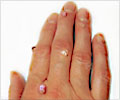Uncircumcised seemed to fare better against genital warts, according a US survey. Nearly 6% of sexually active people surveyed suffered from the problem, it being acute among women in 25-34 age group.
Uncircumcised seemed to fare better against genital warts, according a US survey. Nearly 6% of sexually active people surveyed suffered from the problem, it being acute among women in 25-34 age group.
The National Health and Nutrition Examination Survey looked at 8,849 sexually active men and women aged 18 to 59 from 1999 to 2004.Ten percent of young women aged 25-34 reported being diagnosed with genital warts (peak for women), compared with 6% of men aged 35-44 (peak for men).
The more sexual partners a person reported, the greater their chances of having been diagnosed with genital warts.
Nearly 2% of people with one to two partners report having been diagnosed.
3% of people with three to five partners report having been diagnosed.
7.2% with six to 10 partners report having been diagnosed.
Advertisement
Whites were more likely to report having been diagnosed with genital warts than African-Americans or Mexican-Americans:
Advertisement
4% of African-Americans reported having been diagnosed
2 1/2% of Mexican-Americans reported having been diagnosed
Circumcision appeared to have an effect on rates of genital warts:
4 1/2%Â of circumcised men reported having genital warts
2.4% of uncircumcised men reported having genital warts
Genital warts, a common sexually transmitted disease in the United States, are caused by the human papillomavirus (HPV). Researchers say more than 90% of genital warts are brought on by two strains of HPV, types 6 and 11, WebMD says.
A vaccine to prevent these two strains of HPV (and two other strains) was approved two years ago for girls and women aged 9 to 26 years old. The CDC recommends that 11- and 12-year-old girls receive the vaccination, which is given in three shots.
The vaccine is also recommended for girls and women aged 13 to 26 who haven’t completed vaccination already.
Some 20 states have drawn up bills requiring that young women get the vaccine (which is sold by the name Gardasil). That has generated controversy, with Texas legislators shooting down the governor’s bid to require all 11- and 12-year-old girls to have the vaccine by September 2008.
The CDC says that about half of all sexually active women and men in the U.S. will have a genital HPV infection at some time in their lives. Most HPV infections are cleared by the body.
The survey appears in the April issue of Sexually Transmitted Diseases.
Source-Medindia
GPL/L







